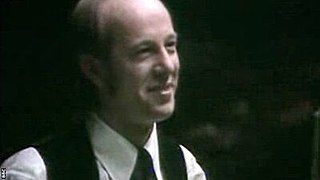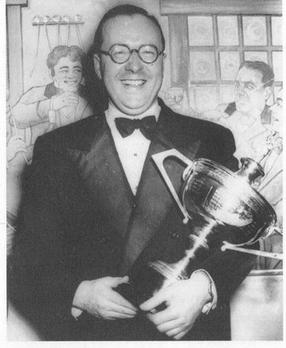
Graham Miles was an English snooker player.
Anthony Christian Meo is a retired English snooker player. He won the 1989 British Open by defeating Dean Reynolds 13–6 in the final, and was runner-up to Steve Davis at the 1984 Classic. He won four World Doubles Championship titles, partnering Davis, and the 1983 World Team Classic representing England alongside Davis and Tony Knowles.

Raymond Reardon is a Welsh retired professional snooker player. He turned professional in 1967 aged 35 and dominated the sport in the 1970s, winning the World Snooker Championship six times and more than a dozen other tournaments. Reardon was World Champion in 1970, 1973, 1974, 1975, 1976 and 1978, and runner-up in 1982. He won the inaugural Pot Black tournament in 1969, the 1976 Masters and the 1982 Professional Players Tournament.
Terence Martin Griffiths is a Welsh retired professional snooker player and current snooker coach and pundit. In his second professional tournament, he became world champion when he won the 1979 World Snooker Championship. He was the second qualifier to win the title after Alex Higgins achieved the feat in 1972; only Shaun Murphy has done it since, winning the title in 2005. Griffiths defeated Dennis Taylor by 24 frames to 16 in the final. Nine years later, in 1988, Griffiths reached the final of the competition again. He was tied with Steve Davis at 8–8, but lost the match 11–18.

John Spencer was an English professional snooker player who won the World Snooker Championship title at his first attempt in 1969. He won the Championship title for the second time in 1971, and was the first player to win the championship at the Crucible Theatre when it moved there in 1977. Spencer was the inaugural winner of both the Masters and the Irish Masters tournaments, and was the first player to make a maximum break of 147 in competition, although this is not recognised as an official maximum because no check was carried out to establish whether the pockets on the table met the required specifications.

Clifford Charles Devlin Thorburn is a Canadian retired professional snooker player. Nicknamed "The Grinder" because of his slow, determined style of play, he won the World Snooker Championship in 1980, defeating Alex Higgins 18–16 in the final to become the first world champion in snooker's modern era from outside the United Kingdom. He remains the sport's only world champion from the Americas. He was runner-up in two other world championships, losing 21–25 to John Spencer in the 1977 final and 6–18 to Steve Davis in the 1983 final. Ranked world number one during the 1981–82 season, he was the first non-British player to top the world rankings.
Anthony Knowles is an English former professional snooker player. He won the 1982 International Open and the 1983 Professional Players Tournament, and was a three times semi-finalist in the World Professional Snooker Championship in the 1980s. His highest world ranking was second, in the 1984/85 season.
The 1989 World Snooker Championship was a professional snooker tournament that took place from 15 April to 1 May 1989 at the Crucible Theatre in Sheffield, England. Organised by the World Professional Billiards and Snooker Association, it was the eighth and final ranking event of the 1988–89 snooker season and the thirteenth consecutive World Snooker Championship to be held at the Crucible, the first tournament at this location having taken place in 1977. There were 142 entrants to the competition.
The 1984 World Snooker Championship was a ranking professional snooker tournament that took place between 21 April and 7 May 1984 at the Crucible Theatre in Sheffield, England. The event was organised by the World Professional Billiards and Snooker Association, and was the eighth consecutive World Snooker Championship to be held at the Crucible since the 1977 event. The event featured 94 participants, of which 78 players competed in a qualifying event held at the Redwood Lodge in Bristol from 1 to 13 April. Of these, 16 players qualified for the main stage in Sheffield, where they met 16 invited seeds. The total prize fund for the event was £200,000, the highest total pool for any snooker tournament at that time; the winner received £44,000.
The 1980 World Snooker Championship was a ranking professional snooker tournament that took place from 22 April to 5 May 1980 at the Crucible Theatre in Sheffield, England. Organised by the World Professional Billiards and Snooker Association (WPBSA), it was the fourth consecutive World Snooker Championship to be held at the Crucible, the first tournament having taken place in 1977.
The 1974 World Snooker Championship was a professional snooker tournament that took place from 16 to 25 April 1974 at the Belle Vue in Manchester, England. It was the 1973 edition of the World Snooker Championship, established in 1927. The 1974 tournament was promoted by Snooker Promotions, and sponsored by tobacco brand Park Drive. The event attracted 31 entrants and carried a prize fund of £10,000. Seven qualifying matches were held; the seven winners of these joined the other 17 players in the main tournament.
The 1973 World Snooker Championship was a snooker tournament that took place from 16 to 28 April 1973 at the City Exhibition Halls in Manchester, England. The scheduling was a change of practice from championships in the preceding years, which had taken place over several months. The tournament was the 1973 edition of the World Snooker Championship established in 1927. The 1973 tournament was promoted by Peter West and Patrick Nally, and sponsored by tobacco brand Park Drive, with £8,000 prize money. There were 24 entrants, a new championship record.

Fred Davis was an English professional player of snooker and English billiards. He was an eight-time World Snooker Championship winner from 1948 to 1956, and a two-time winner of the World Billiards Championship. He was the brother of 15-time world snooker champion Joe Davis; the pair were the only two players to win both snooker and English billiards world championships, and Fred is second on the list of those holding most world snooker championship titles, behind Joe.
Paddy Morgan is an Australian former professional snooker and English billiards player. He was born in Belfast, and moved to Coventry in 1960. Following an amateur career in which he won junior and national titles in both sports, and reached the semi-finals of the 1968 World Amateur Snooker Championship, he emigrated to Australia in 1969. He became a professional player in 1970 and competed in the World Snooker Championship for the first time in the 1971 tournament.
The 1991 World Seniors Championship was a professional snooker tournament that took place from 18 to 22 September 1991 at Trentham Gardens in Stoke-on-Trent, England. It was contested by sixteen players aged 40 or more, including several former World Snooker Champions and was the first staging of the World Seniors Championship. The event was promoted by Barry Hearn and sanctioned by the World Professional Billiards and Snooker Association.
The 1991 Women's World Snooker Championship was a women's snooker tournament played at various venues in the United Kingdom in 1991. Allison Fisher beat Karen Corr 8–2 in the final to win the title, and made a championship record break of 103 in the qualifying rounds.
Caroline Walch is an English snooker player. She has won titles on the World Ladies Billiards and Snooker circuit and was runner-up in the 2000 World Women's Billiards Championship.
Tessa Davidson is an English snooker player from Banbury, Oxfordshire. She won a number of ranking titles on the World Ladies Billiards and Snooker Association circuit.
The 1995 Women's World Championship was a women's snooker tournament organised by the World Ladies Billiards and Snooker Association. The quarter-finals onwards were held in New Delhi from 7 to 10 September 1995. The event is recognised as the 1995 edition of the World Women's Snooker Championship first held in 1976. Karen Corr defeated Kim Shaw 6–3 in the final to win the title. The event was promoted by Barry Hearn's Matchroom company.
The 1999 Nations Cup was a professional non-ranking snooker team tournament that took place at Telewest Arena in Newcastle upon Tyne, England, from 16 to 24 January 1999. It was the first edition of the Nations Cup. The competition was contested by five nations of four players each. The Wales team of Darren Morgan, Mark Williams, Dominic Dale and Matthew Stevens won the title with a 6–4 victory in the final over the Scotland Team of John Higgins, Stephen Hendry, Alan McManus and Chris Small.




